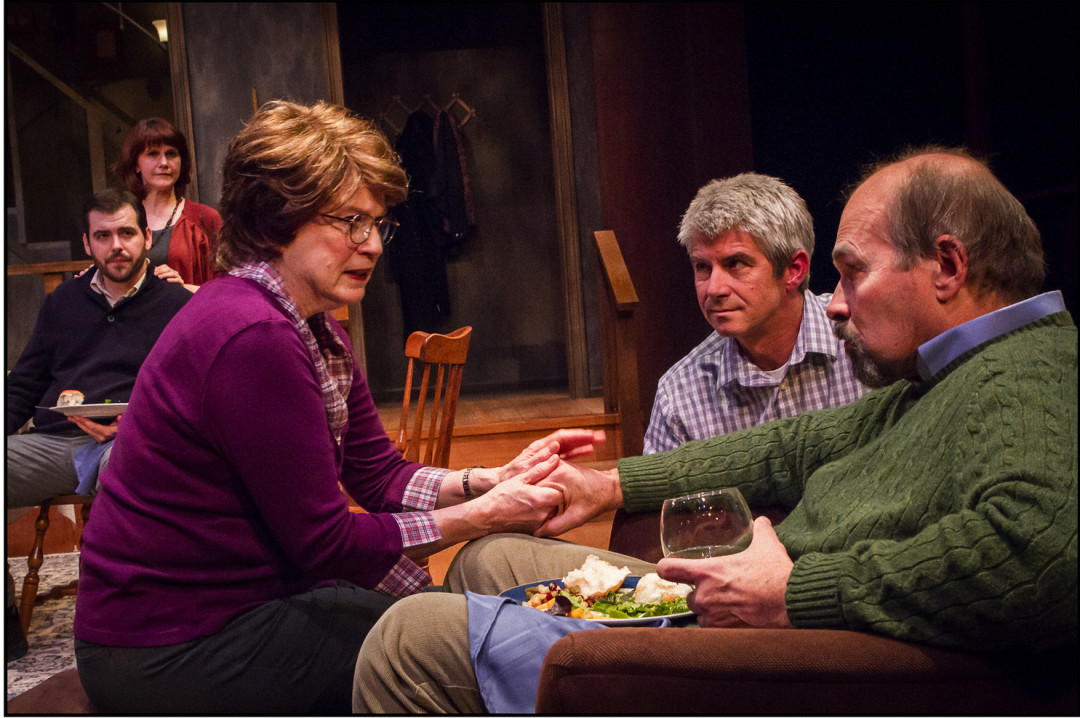Review: Third Rail's That Hopey Changey Thing

Jacklyn Maddux as Barbara soothes Bruce Burkhartsmeier as Uncle Ben. Photo by Owen Carey
With the lackluster first debate closing out what they call in D.C. “the silly season”—that time between the primaries and debates filled with hot air and hyperbole—the drama of the election season is reaching full swing: the pundits calling for blood, the candidates revealing their tragic flaws, and a nail biting ending slaying the hopes of some half of the country.
Playwright Richard Nelson chose a similar moment, the night of the 2010 Mid-Term Elections, as the starting point for his play, That Hopey Changey Thing (named for Sarah Palin’s sneering condemnation of Obama's win). But instead of focusing on the national stage, he sought to capture something he saw missing from the political forum: the individual’s voice, “the voice I hear in my own living room, or on a train, or over dinners at a restaurant,” as he told director Scott Yarbrough in the Director’s Notes. And so, taking Chechov as his inspiration, he sets us a place at the table of the Apple family on election night in upstate New York, as they wend through their personal family dramas and bigger political questioning. This is the first of a four part series about the Apple family that Third Rail Repertory Theatre will present every year, being the only theater outside the Public in New York to do so.
The script balances potent humor with more subtle drama, finding its tensions in Nelson’s astute depictions of the awkwardness, resentments, and occasionally loving breakthroughs of a slightly dysfunctional family. Yet the stakes never reach particularly high, with the comedy pricking any bubble before it grows too uncomfortable, and the acting, at least on opening night, coming on a little strong, stepping on the subtleties. The result is a play that is more entertainment than provocation, but entertainment it certainly is.
The setting is a childhood home in upstate New York where a brother and sister have returned from New York City to dine with their two upstate sisters. The set design, nicely done by Tal Sanders, surrounds the house and stage with a giant wooden frame with a plaque on top, making it into a giant display case diorama, as if to say that, although the story is grounded in a very specific time, it is preserving and depicting something that is much larger and more representative of humankind in general, or at least that subspecies we call Democrat. At the beginning of each scene, the plaque changes to label the scenes like they are anthropological phenomena: “American Manners,” “Clearing the Table,” “Acting and Forgetting.”
Though the conversation turns political, it is at heart a play about family relationships and these subtle anthropological acts. There’s the oldest sister, Barbara, the unmarried schoolteacher who has remained in the family house, flinches at swear words, and passive-aggressively expresses feelings of abandonment—humorously played as the small town school marm by Jacklyn Maddux. Marian (Maureen Porter, the strongest in the cast) also remains upstate, a dyed in the wool party activist who carries the political burden most heavily. Coming to visit are Richard (boyishly played by Michael O’Connell), who is departing his job in the attorney general’s office for a Republican law firm, and Jane (overplayed with a rather off-putting nervous giddiness by Rebecca Lingafelter), who brings along a younger actor named Tim (finely captured by Isaac Lamb, as he awkwardly navigates the family’s dynamics), for whom she presumably left her husband, much to the condemnation of her siblings. Finally, there’s uncle Benjamin (Bruce Burkhartsmeier with squinted eyes and a befuddled paternal charm), their absent father’s brother, who recently suffered a heart attack and a coma. His resulting amnesia acts as the play’s primary comic foil, as well as deepest philosophical metaphor (resulting in lines like, “great acting is simply willed amnesia”), but it also seems a cheap, unrealistic trick for such a naturalistic play, in which Alzheimer’s would seem the more potent affliction.
Yarbrough’s skilled directing is attentive to the finest detail. The play opens with the pantomimed act of setting up dinner, which turns the ritual into a dance, portraying so much about the relationships between the characters through simple movement. And while the family directly takes on the discussion of such dinner party manners at one point (Jane is researching a book on the matter), unfortunately, the play doesn’t get a whole lot deeper than the opening display. The siblings squabble, old wounds come to the surface, alliances and political differences reveal themselves. And certainly there are some poignant and tender moments, primarily in the second half when rifts in our traditionally Democratic family start to surface. Yet—and perhaps I’m just too numb from the nonstop political chatter of election season, in which I feel there are plenty of individual's voices—I never found myself particularly concerned or caught up in any of the characters’ plights.
One possible reason it that, though the staging is finely served, some of the acting feels overdone, giving many lines, which are already too strong in exposition, a condescending effect—in particular, a litany of “I remember…” as they confront their uncle’s amnesia with childhood memories—and flattening much of the subtlety, which is especially troubling for a naturalistic drama that is as delicate a soufflé. I hope it is the nervousness of opening night, and that the actors will relax into their roles.
Another possible reason is that this is but the first of four plays. In the end, Richard, Jane, and Tim go home, and everyone returns to their lives. No final revelations; no meaningful transformations. Just the hints of change—like life perhaps. But they leave many questions unanswered, presumably to be developed over the next three plays. And though I didn’t find myself particularly caught up in any of their individual stories, I can’t deny that I was a little sad to see them go in the end, and I look forward to their return. Just like family.
Third Rail Rep's That Hopey Changey Thing runs through October 28 at the Winningstad Theatre.




